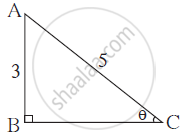Advertisements
Advertisements
Question
Prove the following:
`tanA/(1 + sec A) - tanA/(1 - sec A)` = 2cosec A
Solution
L.H.S:
`tanA/(1 + sec A) - tanA/(1 - sec A)`
Taking LCM of the denominators,
= `(tanA(1 - sec A) - tanA(1 + sec A))/((1 + sec A)(1 - sec A))`
Since, (1 + sec A)(1 – sec A) = 1 – sec2A
= `(tan A(1 - secA - 1 - sec A))/(1 - sec^2A)`
= `(tan A(-2 sec A))/(1 - sec^2 A)`
= `(2 tan A *sec A)/(sec^2 A - 1)`
Since,
sec2A – tan2A = 1
sec2A – 1 = tan2A
= `(2 tan A * sec A)/(tan^2 A)`
Since, sec A = `(1/cosA)` and tan A = `(sinA/cosA)`
= `(2secA)/tanA = (2cosA)/(cosA sinA)`
= `2/sinA`
= 2 cosec A ...`(∵ 1/sinA = "cosec" A)`
= R.H.S
Hence proved.
APPEARS IN
RELATED QUESTIONS
Prove the following identities, where the angles involved are acute angles for which the expressions are defined:
`(cosec θ – cot θ)^2 = (1-cos theta)/(1 + cos theta)`
Prove the following trigonometric identities.
`sin theta/(1 - cos theta) = cosec theta + cot theta`
Prove the following trigonometric identities.
`(cos A cosec A - sin A sec A)/(cos A + sin A) = cosec A - sec A`
Prove the following identities:
`(costhetacottheta)/(1 + sintheta) = cosectheta - 1`
Write the value of `(cot^2 theta - 1/(sin^2 theta))`.
If `cot theta = 1/ sqrt(3) , "write the value of" ((1- cos^2 theta))/((2 -sin^2 theta))`

From the figure find the value of sinθ.
Prove the following identity :
`(cosecA)/(cosecA - 1) + (cosecA)/(cosecA + 1) = 2sec^2A`
If sinA + cosA = `sqrt(2)` , prove that sinAcosA = `1/2`
Find the value of x , if `cosx = cos60^circ cos30^circ - sin60^circ sin30^circ`
Prove that:
`sqrt((sectheta - 1)/(sec theta + 1)) + sqrt((sectheta + 1)/(sectheta - 1)) = 2cosectheta`
If A = 30°, verify that `sin 2A = (2 tan A)/(1 + tan^2 A)`.
Prove that (cosec A - sin A)( sec A - cos A) sec2 A = tan A.
Prove the following identities:
`1/(sin θ + cos θ) + 1/(sin θ - cos θ) = (2sin θ)/(1 - 2 cos^2 θ)`.
If tan θ = `9/40`, complete the activity to find the value of sec θ.
Activity:
sec2θ = 1 + `square` ......[Fundamental trigonometric identity]
sec2θ = 1 + `square^2`
sec2θ = 1 + `square`
sec θ = `square`
Prove that cot2θ × sec2θ = cot2θ + 1
If 3 sin θ = 4 cos θ, then sec θ = ?
Prove that `(1 + sec "A")/"sec A" = (sin^2"A")/(1 - cos"A")`
If 4 tanβ = 3, then `(4sinbeta-3cosbeta)/(4sinbeta+3cosbeta)=` ______.
Statement 1: sin2θ + cos2θ = 1
Statement 2: cosec2θ + cot2θ = 1
Which of the following is valid?
